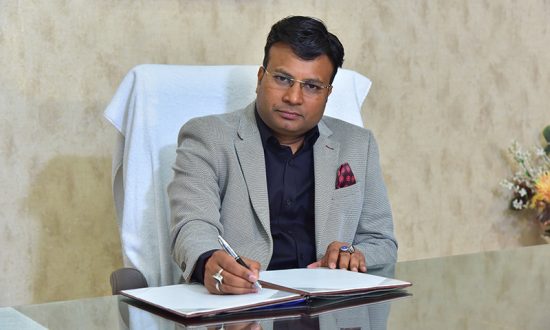Sachin Gupta is one of the youngest first-generation Chancellors in India. It sets him apart and clearly shows his passion for education. His motto is providing holistic education to so that learners will have excellence in life. Sachin Gupta’s journey of two decades in the higher education sector has been unprecedented in terms of influencing the quality and system of higher education in the private sector. With the power of his vision, clarity of his mission and analytical ability, the university under his leadership is poised for achieving greater heights of excellence.
The COVID-19 has highlighted the deficiencies and challenges in our healthcare sector. Healthcare professionals are facing new obstacles and it shows us what we have done in the medical field so far is not enough. It has become a global issue. Global problems require global solutions. As medical students, we are convinced that these skills and attitudes will be even more crucial in the coming years.
In the changing scenario, the role of the doctor must constantly evolve to meet the needs of an unpredictably changing environment and to fulfill the needs of society. Therefore, medical students should prepare to engage in such cases in the future. COVID-19 has had an unprecedented impact on medical education worldwide, leading to the cancellation of lectures, clinical rotations, and ultimately the temporary closure of medical colleges and institutions.
The COVID-19 pandemic, which is both a medical and a social disaster, is due to the attack of this conservative edema of medicine. The coronavirus crisis has highlighted the new challenges healthcare professionals must keep in mind, in the future. Due to COVID‐19 doctors around the world needed to work with local authorities and international bodies, as well as with each other, to limit the effects of the outbreak. The epidemic has served to remove the aristocratic and individualistic barriers of medicine that keep the private and public, rich and poor, and individual patients and community apart.
Why there is need of medical practitioners to develop evolving skill sets?
Upskilling and reskilling is an integral part of developing skills and also become necessary to stay competitive in today’s world given the changes brought by technologies and even societal shifts. Medical professionals are also expected to keep themselves up to date with the latest developments in clinical sciences and medical technologies.
The curriculum is yet to catch up to the global standards of medicine and education because the degree earned by Medical graduates today is with limited or no exposure to new technologies, so the skills they are learning have to be updated too.
To develop critical knowledge and understanding of medical education there is need of proper training, infrastructure, and guidelines, which is lacking in online learning. So additional training is required for those in the medical and healthcare services.
Today the process of treating a patient requires a communicative approach that involves technical expertise with good communication skills apart from just clinical expertise.
In this global Pandemic the role of the doctor to foresee and adapt to potential healthcare challenges are increased. Here are some details where medical students need to pay more attention.
Break Year
Students appeared in NEET 2020 were low and many students took this year as a break year, so Class XII freshly pass-outs will face tough competition from break-year students. They will face a heavily revised syllabus, tough question papers, and tougher evaluations.
Promote a healthy lifestyle
A healthy lifestyle can be promoted through nutritious foods and hygiene for that it is a relevant and important strategy to involve nutrition education, as part of the curriculum of schools and colleges and reducing the burden of malnutrition and obesity. For that, it is needed to launch a nationwide social movement for better nutritional outcomes – through expanded actionable partnerships with agencies and institutions by creating a nutritional resource network of technical and educational institutions such as medical colleges, home science colleges, etc.
Stress
The pandemic has increased the stress of everyone and medical students are not immune to it. Due to the highly demanding course, there are many reasons for stress which causes various adverse impacts on students’ physical and psychological health. Not being able to do the practice for the subjects in the lab is adding extra stress.
Orthodox syllabus and teaching style
In the current digital era, there are many changes in the medical field, but the medical syllabus is not updated. New opportunities in medical science are barely touched. Study patterns are teacher-centered which doesn’t use technology as much as it is used abroad. It leads to a compromise in the quality of doctors. The traditional medical curriculum should be improvised with communication skills in the form of Continuous Medical Education (CME), to encourage students with proper training to develop good communication skills.




